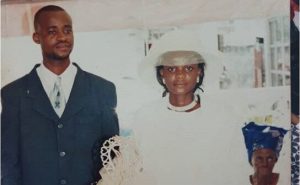‘Queerness isn’t a western concept’: Adeju Thompson is bringing genderless Nigerian fashion to the world
Written by Nadia Leigh-Hewitson, CNN”There are very early examples of gender bending in African culture,” explains the designer behind the gender-fluid Nigerian clothing label Lagos Space Programme. “Queerness isn’t a western concept.” From West Africa to Europe and beyond, non-binary fashion designer Adeju Thompson is showcasing genderless African fashion on the world stage.Thompson, 30, who uses they/them pronouns, grew up in Lagos and, bar a stint studying fashion design in the UK, has lived in Nigeria their entire life. In 2018, Thompson founded label Lagos Space Programme. “I’m always collaging different ideas, tying all these things together,” Thompson said. “To highlight the queer community and also to make fun of myself and make fun of fashion.”The result is luxurious indigo-dyed organic fabrics and elegant knitwear, offset by striking sculptural handcrafted brass accessories that flirt with queer iconography.Many of Thompson’s designs use adire, an indigo resist-dyed textile — a key component of traditional clothing worn by West African Yoruba people. The heritage textile is reimagined by Thompson, in a modern context, by applying the dye technique to knitwear. Thompson calls this reinvention “post adire.”‘We greet attire before we greet its wearer’In the last year, Lagos Space Programme has skyrocketed onto the world stage showing collections in Lagos, Paris and Milan. In January, Thompson debuted their spring-summer 2021 collection at Milan Fashion Week.The collection, called “Aso Lànkí, Kí Ató Ki Ènìyàn,” takes its name from a Yoruba saying which translates as: “We greet attire before we greet its wearer.” Thompson says the collection responds to a turbulent year of pandemic and socio-political unrest in Nigeria, by addressing community and shared identity through clothing, to remind people that they are still together even though they have been physically isolated.A hand-knitted “post-adire” cape blouse, made of adire patterned fabric, dyed with natural indigo, paired with
Yoruba wide trousers. Credit: Kadara EnyeasiThe designs are also informed by a period Thompson spent in Osun in southwest Nigeria, a time of personal revelation.While there, an Osun high priestess showed Thompson two objects with great spiritual value: a dagger and a fan. In traditional ritual, Yoruba people hold both objects, representing the balance between the femininity and masculinity in the individual. “This was always a part of our identity,” Thompson explained.”I was bullied as a child because I wasn’t very masculine, and I’ve always felt more connected to my feminine side,” Thompson told CNN. “There’s been a great deal of trauma for me around my masculinity, and I like that as an adult I can fashion the life I want, and I can easily mediate between both genders and create a space that works for me.””I’ve just always felt incredibly fluid in how I express myself, because it’s always felt very natural to me,” Thompson explained. “I’m just so aware on a historical and personal level the damage toxic masculinity can cause. It’s just not a space I connect with.””It’s so important for me to express myself and share my story through my work,” Thompson added. “(It’s) my contribution to the political and cultural conversation.” Beyond the runwayDuring lockdown, queer British photographer Craig Waddell reached out to Thompson over social media, asking to collaborate.”Usually when I show on my work it’s on Black bodies, but this photographer is a White non-binary photographer from London,” Thompson told CNN. “All the models they showed Lagos Space Programme on were White. When I design for Lagos Space Programme, the designs are for everybody.”Adeju Thompson. Credit: Courtesy Konstantin VulkovThis fall, the label will launch a collection of designs at Nigerian high-end fashion store Alara. Celebrating contemporary design and queerness meeting heritage, the opening of the collection will be in the form of an adire textile symposium.The opening of the collection is set to coincide with Lagos Space Programme’s second showing at Milan Fashion Week this September. “This time around, I specifically asked to show in their womenswear collection,” Thompson says, explaining their desire to subvert gender norms at the event by using non-binary and male models to walk their designs.Sophisticated and subversive, Thompson’s designs are also gaining traction beyond the runway. Earlier this year, Lagos Space Programme was invited to exhibit in the Africa Fashion Exhibition 2022 at the Victoria and Albert Museum in London, scheduled to open next June. “I want Lagos Space Programme to champion conversations around gender, indigenous knowledge and highlighting an alternate narrative around the African experience,” Thompson said.







